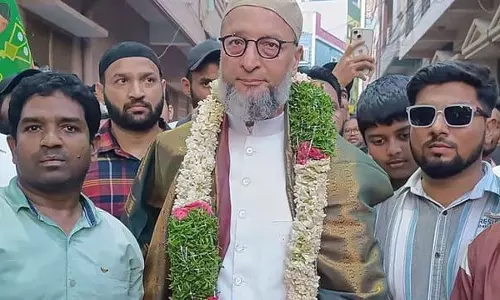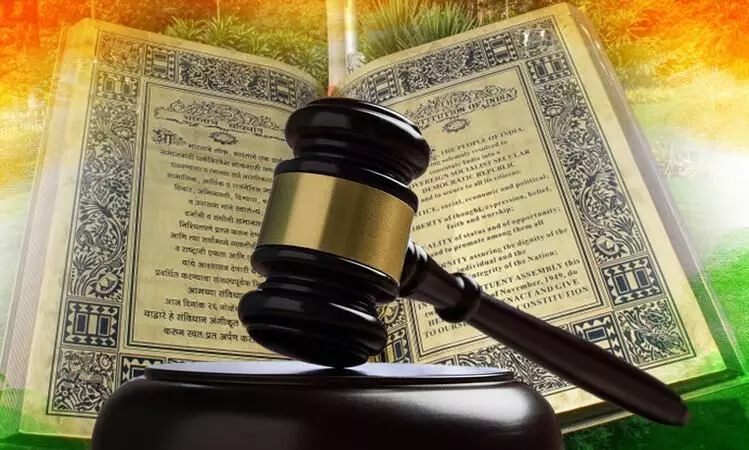
Republic: An era of hopes and aspirations
text_fieldsIt was Chief Justice Charles E. Hughes of the US Supreme Court who gave the most captivating feature of a Republic. He said in effect that a republic is one that endures and this is the symbol of its faith. As the nation celebrates the 74th Republic Day to commemorate the ‘greatness of the occasion’ registered in the minds of the multitude in India 73 years ago, it is not merely a day of pride, but a moment of emotion -an occasion when every Indian remembers that he is an Indian.
The newborn nation, glorified with the pledge and pride of independence and now becoming a republic was expected to enjoy the true strength of its independence. The origins, nature, development and destiny of the Indian republic and its constitutional system of governance have ever raised perennial public concerns.
Republic represents people’s concern and popular involvement in government. Framers of the Constitution were radically republican, believing that the only legitimate form of government was one in which public authority derived entirely from the people. They shared the wisdom that everything must flow ultimately from the people and the people must rule, albeit not directly. We have a Constitution of the people which is also the Constitution of the nation. Sovereignty inheres in the organism of people and the people constitute the republic.
An individual is born into a republic and remains under the State. Over time, it has become credibly known that to live in a republic is exciting, and at times, challenging. The republic has expanded participatory possibilities of all classes of Indian people and facilitated new images of modern life that inspire high hopes of personal and social advancement.
Birth of Freedom
At the core of the Indian Republic is the idea of liberty. The making of a constitution and the complicated machinery through which the Government functions can hardly excite the vast majority of people who take little interest in the intricacies of the government and administration. What they look for is only the fruits of freedom in other directions. No constitution, however wisely framed, can be a substitute for what the people want. It is not the provisions in the constitution as much as the manner in which they operate and the final test lies in their ultimate effect in raising the steely stature of the people and increasing their material resources.
Hopes of republic ring and spring eternal in the mind of every Indian. The architects of the Constitution not only wanted India to be a republic but also perceived that, for the republic to survive, the Constitution must be supreme. They also realized that the supremacy of the Constitution depends upon an independent judiciary –one with the power to resolve disputes between the States, between the State and the national government, and, most importantly, between the citizens and State.
However, in recent years, the Supreme Court has been subjected to much ill-informed and crude criticism. “To distrust, the Judiciary”, according to Honore Balzac, makes the beginning of the end of society. Disinterested criticism of the Institution which stirs in the court a continual awareness of its accomplishments and failures, without injuring the institutional character of the court will definitely improve the court’s image and give strength to the rule of law. On the contrary, raising utterly unfair criticism would weaken the institution. It has to be borne in mind that Courts are the channels by which King’s justice flows to the people.
Economy of social justice
In a republic, the passion for equality and social justice cannot stop with mere charity or with the abolition of title or privilege and the availability of opportunity for all or in the achievement of abundance. It is the democratic process that should offer the most feasible formula for justice and equality in the most trustworthy manner. The establishment and working of democracy are thus fundamental to the republic. In a republic, people hold political power but elect representatives to exercise that power.
Indian republicanism possesses a noble inheritance, brought in by the blood and toil of our forefathers. No other form of government has better stood the test of time. The Republic of yesterday, today and tomorrow, if wisely improved and faithfully guarded, is capable of transmitting to us and posterity all the substantial blessings of life, liberty, the pursuit of happiness and independence. With charity for all and malice towards none, our republic moves with firmness in the right path. Thinking along the lines of Abraham Lincoln, we are on the mission of striving to finish the unfinished work we are in, to bind up the nation’s wounds, and to do everything that may achieve a just and lasting peace among ourselves and with all nations.
Remember the women
The incredible accomplishments of women who orchestrated the independence movement and the founding document from the forefront and behind the scene can never go unnoticed. The details of such women are known from their letters and ledgers. The bravery of these women contributed to the ‘Free India’ and inspired the founders to make this country honour them. They were very politically passionate and dedicated to the patriotic cause. They proved that women are really equal to if not better than their male counterparts in patriotism since they suffered in equal measure all the hardships and made all the sacrifices for the cause.
Though gender equality has been recognized as an article of faith in our Constitution, it is yet to be realized. Women’s status in the total context of society, in professional, legal, economic, cultural and social spheres needs to be improved through careful analysis and scientific planning.
The New Middle Class
The emergence of a new middle class is already happening in the country. It is a factor behind improved economic and social outcomes. Almost a billion people will join the ranks of the new middle class by 2025, playing a crucial role in political, cultural and economic life. The rising middle class, the ‘bird of gold’, has become an engine of growth and social transformation in education, gender equality and forms of expression.
The new middle class is well-educated, enterprising, and innovative. They have emerged as the source of consumption and entrepreneurship. They are contributors to savings and human capital as well. Thus the future growth of the Indian republic would depend on the rising middle class. Lester Thurow, an eminent MIT economist says, “A healthy middle class is necessary to have a healthy political democracy. A society made up of rich and poor has no mediating group either politically or economically”.
Reconstructing the Republic
The Republic has provided the basis for individual freedom, economic growth, social progress and political stability. Not only is India a land of four rivers, but it is also a land where people from all corners of the globe find a home. The new India should pay tributes to those who made a free India by serving the country with devotion and perseverance, who made the nation a better place for everyone to live in, and who live a sustainable lifestyle by conserving resources for their successors.
Everyone should become a torchbearer for a positive transformation for nation-building, by every little means they can. Let the future of the Indian Republic be characterized by peace, prosperity and good fortune, as hoped by Harry Truman, the former US President in his letter addressed to Dr Rajendra Prasad, on the occasion of our country becoming a new republic.
On this memorable day in the chequered history of our country and of our people, the thought that springs uppermost is that “May the Republic be strengthened in its path of achievements; may it help us realize all that is best in our traditions - sanity, tolerance and values of life. Let the illuminations of the Day and the allied celebrations awaken us to its realization. Republic day may come and go in vain if lamps are lit only in stately buildings, and the humble homes of the poor remain in dark. Let the country awake, arise and strive in this great task of dedication.
The author is a lawyer practicing in Kerala High Court























